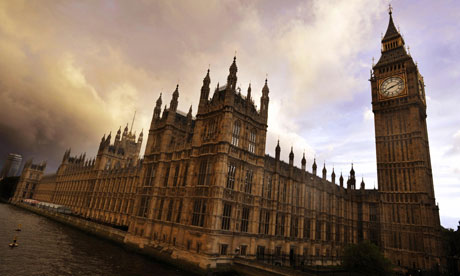Plans to relax the rules on MPs' expenses seem to have been met without protest – but this may not be the end of the matter
By Paul Goodman, Guardian, Friday 25 March 2011 16.30 GMT
 MPs are unhappy about constrictions on their expenses. Photograph: Tim Ireland/PA
MPs are unhappy about constrictions on their expenses. Photograph: Tim Ireland/PAIn his novel Arthur and George, Julian Barnes writes his thoughts into the mind of its central character, George Edalji – a cause celebre in England whom Barnes compares to Dreyfus in France. Across the channel, he suggests, memories are long, but here they're otherwise.
"This has happened, now let us forget about it and carry on as before: such was the English way. Something was broken, but now it has been repaired, so let us pretend that nothing much was wrong in the first place."
Is the aftermath of the expenses scandal about to prove Barnes right? The Independent Parliamentary Standards Authority (Ipsa) has released recommendations about MPs' expenses. It proposed relaxing the rules: MPs from outer London are to be allowed to claim for second homes; some restrictions on family claims are to be relaxed; wide use of parliamentary credit cards is to be allowed. When these changes were floated, there was no media explosion, no voter backlash.
Why so, when the expenses debacle caused such public rage? Perhaps because Ipsa has faced opposition on two fronts. Many MPs see it as arbitrary and inefficient – usurping their right, as they see it, to determine their own conditions. And parts of Fleet Street view it as bureaucratic and expensive – achieving nothing, they say, that couldn't be done by simply publishing MPs' expenses online at a fraction of the cost.
This is roughly the position of the Daily Telegraph, which first exposed the expenses story. The tormentor of MPs and its victims thus find themselves in unlikely agreement. Under pressure from this alliance, Ipsa has been left friendless. And while this morning's reports of its recommendations weren't exactly supportive – it would be a wonder if they had been – the tabloids didn't clear their front pages to assault the package and the topic didn't trend on Twitter.
But that isn't quite the end of the matter. For like the wind, newspaper editorials and the social media blow where they will. There's never a good time to propose that the constrictions on MPs' expenses be eased; but to do so in the aftermath of a budget that reminds voters of pain to come is hazardous. And although the matter is nothing to do with the government, strictly speaking – MPs' pay and expenses are a matter for the Commons – the risk is largely being shouldered by the prime minister.
It was his predecessor, after all, who introduced the act that set up Ipsa in the first place, in response to pressure to sort out the scandal. So if the media and public mood changes, and David Cameron comes under similar stress, shouldn't he simply block Ipsa's plans, if only for the sake of a quiet life? If only matters were so simple. For at the same time as many voters will believe that Ipsa's has gone too far, some MPs will mutter that it hasn't gone far enough.
Their core gripe isn't so much about particulars as a principle: that claims must be backed by receipts. As long as the latter are required, many say, one MP's claims will be compared against those of others in their local papers when receipts are released each quarter. And as they view it, this leaves them pinned by a Morton's Fork: they either claim, and see voter support erode as they're pilloried by their local press; or don't claim, and end up subsidising their own work. They want the receipts regime replaced by flat-rate allowances.
The last release of quarterly receipts ignited an explosion during the usually staid proceedings of the 1922 Committee. MPs lined up to denounce Ipsa. The prime minister is caught between voters – who want receipts and tough conditions – and MPs who want allowances and less constriction. With local elections and the alternative vote referendum looming – not to mention war in Libya and turmoil in Portugal – the latter will probably keep their complaints to themselves for the time being.
But for Cameron, this looks like trouble postponed, perhaps until the next quarterly release – rather than trouble sorted. Above all, it's too early to tell whether memories of the expenses saga are fading away, like memories of the Edalji controversy, or will blaze up again with the explosive quality of the Dreyfus affair.

No comments:
Post a Comment